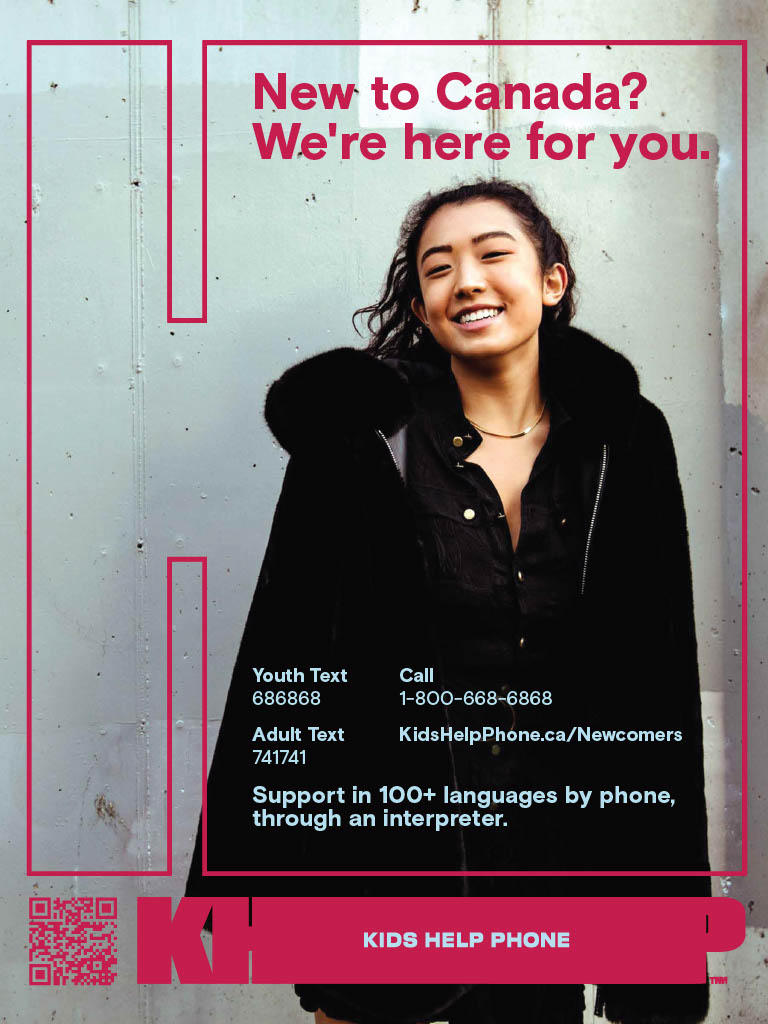Kids Help Phone is an e-mental health service offering free, multilingual and confidential professional counselling, crisis support, and information to young people in Canada.
Who can call Kids Help Phone?
Kids Help Phone is available 24/7 for free to kids, teens, and young adults from any community in Canada. This service is available to all youth in Canada regardless of their legal status. You don’t need an ID to contact Kids Help Phone.
If you're outside Canada, you can use Child Helpline International to find helplines worldwide.
To contact Kids Help Phone:
- You can call 1-800-668-6868 to speak with a professional counsellor (available in 100+ languages, 24/7)
- You can text CONNECT to 686868 to text with a trained volunteer crisis responder (available in English and French, 24/7)
- You can message a professional counsellor online using their Live Chat (available in English or French from 7 PM - midnight)
- If you're not ready to ask a question or just want more information, you can find up-to-date resources on various topics.
If you or someone you know is in immediate danger, call 911 or the emergency services in your area immediately. If you are having suicidal thoughts, Call or text 9-8-8, Canada’s confidential suicide crisis helpline, at any time for free.
What services does Kids Help Phone offer?
Kids Help Phone offers a variety of services to help you with whatever you’re going through:
- Learn about mental health: Understand how your thoughts, feelings, and behaviours are connected.
- Build your skills: Use tips and resources to improve your skills and well-being.
- Connect with other young people across Canada: Read stories from other youth, share your experiences, provide encouragement, ask questions, and get support.
- Get support: Talk to a professional counsellor (call or live chat) or a trained volunteer crisis responder (text) to understand what you’re going through and get help moving forward. You can call them more than once if you need to. Each time you call, you’ll speak with a different counsellor.
- Find Local Support: Find physical or virtual support programs and services in your area.
Do I need a serious problem to call?
No issue, feeling, or concern is too big or too small to contact Kids Help Phone. Youth contact counsellors for many reasons, like trouble with homework, a fight with their parents or thoughts of suicide. Kids Help Phone is available to all young people in Canada, no matter the situation, question or concern.
You can talk about anything on your mind, including:
- Relationships: Family, friends, dating, school, etc.
- Mental and Emotional Health: Addictions, anxiety, discrimination, eating disorders, loss, grief, managing emotions, self-esteem, self-injury, and more.
- Violence: Abuse, bullying, discrimination, racism, sexual harassment, and other types of violence.
- Suicide: Thoughts of suicide, previous attempts, someone close to you being in crisis, or the loss of someone to suicide.
Can I get help with matters related to my religion or culture?
You may need support with specific religious and cultural concerns. For example, being embarrassed to wear a hijab at school even though your parents want you to.
Kids Help Phone counsellors are trained to counsel callers on these types of issues, and each has access to a database of almost 20,000 community resources across the country, including culturally-specific ones. Once a caller’s issue is identified, counsellors can provide them with all the options to help them make decisions that respect their values and culture.
Can I get help in my language?
Although the written resources are only available in English or French, you can call Kids Help Phone in over 100 languages, including Ukrainian, Russian, Pashto, Dari, Mandarin and Arabic. When you call, let the counsellor know which language you’d like to use, and they’ll connect you with a trained interpreter. Learn more.
Is it confidential? Will my parents find out I called?
All calls and chats are anonymous and confidential. You don’t have to tell the counsellor your name, phone number or address.
The number may appear on your phone bill, depending on your phone carrier. However, the names Kids Help Phone or Crisis Text Line will not appear anywhere on your bill.
If you prefer, you can use Live Chat counselling, available in French or English and open daily from 7 PM to midnight ET. You can hide the chat at any time by clicking “Hide Page” on the right corner of the Kids Help Phone website. If you are worried about someone going through your internet history and seeing that you visited the Kids Help Phone website, delete your internet history once you are done.
Also, Kids Help Phone doesn’t collect contact information or do follow-ups. They never trace calls or track IP addresses. They only go against their promise if a caller shares personal information and is in one of the following situations:
- The caller is planning to hurt themselves or someone else.
- A crime has been committed.
It is illegal for counsellors not to report these situations to the police, but they would have to know who the caller was and what was happening to them in order to make a report.
As for community resources, they only complete forms for referrals to emergency services (like police, EMS, or the Children’s Aid Society). Once they’ve referred you to an emergency service and know you’re safe, the call ends, and they don’t follow up. If the emergency service needs more information, they may call back and ask to speak to the counsellor who took the call.
To learn more, you can check out the Kids Help Phone phone service’s privacy policy.
For more information
- Resources Around Me: Find available support programs and services in your area, with options for filtering by language and community.
- Good2Talk: Access 24/7 free and confidential professional counselling, crisis support, and information for post-secondary students.
- All Kids Help Phone Resources: Discover a variety of mental health resources.
Presented by: Kids Help Phone

